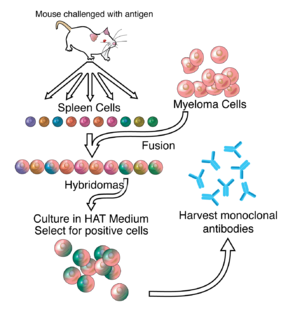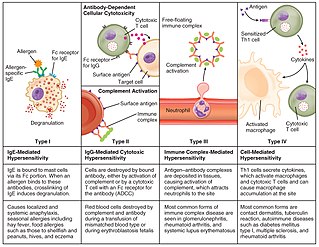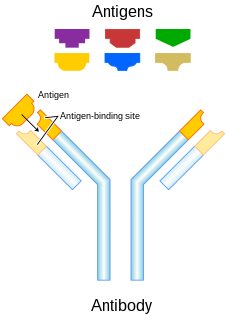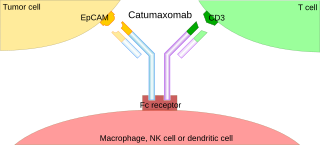
A monoclonal antibody is an antibody made by cloning a unique white blood cell. All subsequent antibodies derived this way trace back to a unique parent cell.

Hypersensitivity refers to undesirable reactions produced by the normal immune system, including allergies and autoimmunity. They are usually referred to as an over-reaction of the immune system and these reactions may be damaging and uncomfortable. This is an immunologic term and is not to be confused with the psychiatric term of being hypersensitive which implies to an individual who may be overly sensitive to physical and/or emotional stimuli. Although there is a relation between the two - studies have shown that those individuals that have ADHD are more likely to have hypersensitivity reactions such as allergies, asthma, eczema than those who do not have ADHD.

Sir Gregory Paul Winter is a Nobel Prize-winning English molecular biologist best known for his work on the therapeutic use of monoclonal antibodies. His research career has been based almost entirely at the MRC Laboratory of Molecular Biology and the MRC Centre for Protein Engineering, in Cambridge, England.
Immunogenicity is the ability of a foreign substance, such as an antigen, to provoke an immune response in the body of a human or other animal. It may be wanted or unwanted:
Humanized antibodies are antibodies from non-human species whose protein sequences have been modified to increase their similarity to antibody variants produced naturally in humans. The process of "humanization" is usually applied to monoclonal antibodies developed for administration to humans. Humanization can be necessary when the process of developing a specific antibody involves generation in a non-human immune system. The protein sequences of antibodies produced in this way are partially distinct from homologous antibodies occurring naturally in humans, and are therefore potentially immunogenic when administered to human patients. The International Nonproprietary Names of humanized antibodies end in -zumab, as in omalizumab.
Muromonab-CD3 is an immunosuppressant drug given to reduce acute rejection in patients with organ transplants. It is a monoclonal antibody targeted at the CD3 receptor, a membrane protein on the surface of T cells. It was the first monoclonal antibody to be approved for clinical use in humans.
The nomenclature of monoclonal antibodies is a naming scheme for assigning generic, or nonproprietary, names to monoclonal antibodies. An antibody is a protein that is produced in B cells and used by the immune system of humans and other vertebrate animals to identify a specific foreign object like a bacterium or a virus. Monoclonal antibodies are those that were produced in identical cells, often artificially, and so share the same target object. They have a wide range of applications including medical uses.

Monoclonal antibody therapy is a form of immunotherapy that uses monoclonal antibodies (mAbs) to bind monospecifically to certain cells or proteins. The objective is that this treatment will stimulate the patient's immune system to attack those cells. Alternatively, in radioimmunotherapy a radioactive dose localizes a target cell line, delivering lethal chemical doses. Antibodies have been used to bind to molecules involved in T-cell regulation to remove inhibitory pathways that block T-cell responses. This is known as immune checkpoint therapy.
Lemalesomab is a mouse monoclonal antibody for the diagnosis of inflammatory lesions.
Metelimumab (CAT-192) is a human IgG4 monoclonal antibody that neutralizes TGF beta 1 which had been chosen for further development for the treatment of diffuse cutaneous systemic sclerosis, also known as scleroderma. It was dropped from further development in favour of fresolimumab, which was being developed by Genzyme as of 2006.
Odulimomab is an investigational drug for the prevention of transplant rejection and for the treatment of various immunological diseases.
Galiximab is a monoclonal antibody designed for the treatment of B-cell lymphoma. As of September 2009, it is undergoing Phase III clinical trials. The drug is a chimeric antibody from Macaca irus and Homo sapiens.
Toralizumab was a humanized monoclonal antibody and an immunosuppressive drug. Possible indications included treatment of antibody-mediated disorders, T-cell-mediated diseases, and B-cell malignancies such as CLL/small lymphocytic lymphoma, follicular cell lymphoma grade I or II, marginal zone lymphoma, mantle cell lymphoma, MALT lymphoma, Waldenström's macroglobulinemia, monocytoid B-cell lymphoma; relapsed/refractory Hodgkin's disease).
Etaracizumab, also known as MEDI-522, trade name Abegrin, is a humanized monoclonal antibody which is being investigated for the treatment of metastatic melanoma, prostate cancer, ovarian cancer and various other types of cancer. It is manufactured by MedImmune.
Conatumumab is a monoclonal antibody developed for the treatment of cancer. It is a fully human monoclonal agonist antibody directed against the extracellular domain of human TRAIL receptor 2 with potential antineoplastic activity. Conatumumab mimics the activity of native TRAIL, binding to and activating TR-2, thereby activating caspase cascades and inducing tumor cell apoptosis. TR-2 is expressed by a variety of solid tumors and cancers of hematopoietic origin.
Figitumumab is a monoclonal antibody targeting the insulin-like growth factor-1 receptor that was investigated for the treatment of various types of cancer, for example adrenocortical carcinoma and non-small cell lung cancer (NSCLC).

A trifunctional antibody is a monoclonal antibody with binding sites for two different antigens, typically CD3 and a tumor antigen, making it a type of bispecific monoclonal antibody. In addition, its intact Fc-part can bind to an Fc receptor on accessory cells like conventional monospecific antibodies. The net effect is that this type of drug links T cells and monocytes/macrophages, natural killer cells, dendritic cells or other Fc receptor expressing cells to the tumor cells, leading to their destruction.
Amatuximab is a chimeric monoclonal antibody designed for the treatment of cancer. It was developed by Morphotek, Inc.
Fulranumab is a monoclonal antibody against nerve growth factor. It was designed for the treatment of pain.
Bamlanivimab/etesevimab is a combination of two monoclonal antibodies, bamlanivimab and etesevimab, administered together via intravenous infusion as a treatment for COVID-19. Both types of antibody target the surface spike protein of SARS‑CoV‑2.




